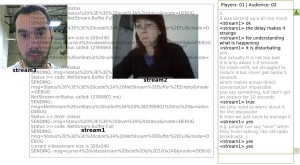London was typically wet and grey when I arrived for the Situation. However this did not put anyone off coming to the pre-workshop meeting that we had on Saturday afternoon, to meet each other and start sharing ideas around the theme. Fourteen people, including local residents, artists and students, braved the weather to come to Finsbury Park and start the process. We introduced ourselves and gave a background to the project, then began to talk about the chosen situation: e-waste.
A lot of anecdotes were shared; e-waste touches pretty much everyone, whether it is what to do with phones or computers when upgrading, or how it’s now possible to pick up video players for next to nothing which is great if you want to watch video tapes. O’Niel Howell from Bright Sparks talked about the ways that manufacturers make appliances unrepairable by having sealed units or specific screwheads that mean you can’t open something up to fix a basic fault. The market is so saturated with cheap items that repair businesses cannot compete, and consumption-oriented advertising cultivates the mentality that a new, cheap item is better than a repaired item. Eva Ursprung from Schaumbad talked about how she had been advised to have a 30-year old military truck for her work in Africa since everywhere people could fix these vehicles if they break down, whereas they can’t fix new cars. Katarina told the story of her chemist father who salvages machinery from disused factories since it functions much better than new machines. Tom Keene said that built-in obsolescence was introduced with the washing machine: the first washing machines were so well-built that they never broke down, and the manufacturers realised that they would not be able to keep making a profit with such good machines. Many similar stories were shared – we will certainly have no shortage of material for the performance! But the situation really is, how do we change this? It used to be that when you bought a fridge, for example, it was expected to last for the rest of your life. People used to be prepared to pay for quality workmanship and good materials, and to want products that lasted. Now, it’s almost the opposite – getting a bargain is more important, & don’t worry if it breaks because then you can upgrade to the latest model …
On Sunday I had a day off, so I went at Ruth’s recommendation to the Kurt Schwitters’ exhibition at the Tate Britain. It’s a good exhibition and very relevant to our theme as well, with Schwitter’s concept of “merz” and his recycling process of collaging found materials in his work. One of his quotes has stuck with me in particular: “Create connections, if possible between everything in the world”. That’s what we want to do with this project – discover the connections between the issues that really matter to people at a local level, and connect people in discussion about it. The Schwitters exhibition also brought back nice reminiscences about Merznet, one of the performances at the 080808 UpStage festival.
 Today Ale and I have been at Furtherfield‘s gallery in Finsbury Park with Rich, the technician; as well as sorting out what we need in terms of heating, projectors, lights, cables, etc., we have been online with Martin in Augsburg and Romain in Nantes, testing the streaming in UpStage. It’s pretty exciting to have it working! The workshop begins tomorrow and after the introduction (which won’t need to be long since we had such a good turn-out on Saturday) we will be able to start playing with it. I can’t wait!!!
Today Ale and I have been at Furtherfield‘s gallery in Finsbury Park with Rich, the technician; as well as sorting out what we need in terms of heating, projectors, lights, cables, etc., we have been online with Martin in Augsburg and Romain in Nantes, testing the streaming in UpStage. It’s pretty exciting to have it working! The workshop begins tomorrow and after the introduction (which won’t need to be long since we had such a good turn-out on Saturday) we will be able to start playing with it. I can’t wait!!!